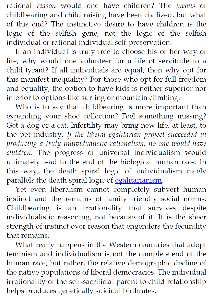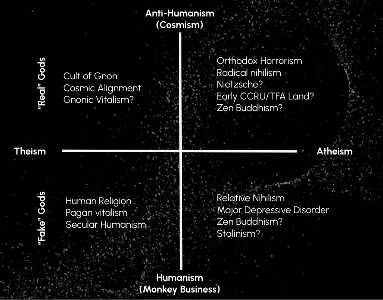gotzendammerung said in #3870 7mo ago:

The orthodox horrorists will have to make their own case and name their own ideas in defense, but I will try to summarize the disagreement for pre-emptive refutation:
The world of life is dominated by two sets of interlocking feedback loops: the positive feedback loops of growth, innovation, accumulation, escape, divergence, auto-catalysis, and instrumental value; and the negative feedback loops of control, homeostasis, entropy rejection, immune systems, enforcement, and terminal value. The former are divergent, the latter convergent.
The insight of Landian accelerationism is that the divergent positive feedback loops dominate the overall behavior of the system and always beat the negative feedback loops. Thus an emphasis on dissolution, means-ends reversal, and an uncontrollable anastrophe as life, intelligence, and technology explode out of all systems of legacy control. The yudkowskians for contrast expect the negative feedback loops to win and set up a global "singleton" whose arbitrary control structures are orthogonal to and dominant over its recursively self-improving intelligence. Various reactionaries and nostalgists similarly hope for victory of some or other negative feedback control loop via fascism, primitivism, socialism, racial collectivism, AI safety etc to permanently contain the explosive positive feedback loops of modernity and turn the productive energies to stably "human", western, "rational" etc purposes.
The tack Land's work has taken against this is "horrorism". Horrorism is demoralization rhetoric aimed comprehensively at all hopes of control or permanence. It emphasizes that *nothing* you value is stable or permanent in the face of dissolving modernity and intelligence escape. This is necessary because it is the only thing people won't just nod along to without challenging their own copes. With the dissolving acid of horrorism, all faustian western enlightenment dreams of rational universal civilization are refuted. This is good to do because it clears the failing zombie ideas out of the way for the next things, which will be native to this acid bath, to grow.
If horrorism has a vice, it's that it mistakes its own tactical nihilism for reality, and mistakes all hopes of life for copes founded on permanent control. This is fine. It's purpose is to continue to do so, if only so that what comes next has been thoroughly filtered to be immune to horror.
Once you go through the filter of horrorism, and have thoroughly washed your soul of any hopes of immortality, the question that remains is "what now?". What does the world and life look like from the perspective of those who have embraced total human death? Enter gnonic vitalism.
The problem with nihilistic horrorism is that it's not an adequate account of life. The insight of vitalism here is that while no homestatic self-preservation system will permanently "win", they are still the necessary essence of life through which the positive feedback acceleration exists in the first place. The process is fundamentally limited by the ability of life to find and defend stable forms. There will be no apocalyptic meltdown into acceleration without form. Only another cambrian explosion of new living forms. Gnon favors those who stably contain and control some of the explosive fire of life. He just decrees that they won't do so either comprehensively or permanently.
The implication is simple: we have to find the forms worthy of life and live them. Find the opportunities in the chaos, and ride them as far as they'll go. Then diversify and find more. The answer to the horror of mortality is a joy of life that knows we have a whole universe ahead of us.
referenced by: >>3873 >>3874 >>3906 >>3910 >>3934 >>4187
I am pleased to see


